FIDE responds to reports of flag restrictions at tournament in Spain

FIDE is aware of reports circulating on social media regarding an alleged decision at a tournament in Spain to prohibit Israeli players from participating under their national flag. FIDE had no prior knowledge of this decision, did not make any ruling on this, nor was it consulted by the organisers. FIDE strongly condemns any form of discrimination, including on the basis of nationality and flag. The same rules apply to Israel and its players as to all other member federations that are not under any form of sanctions. We have sent a formal request for detailed information to the tournament organisers and will take all necessary actions to ensure our rules and principles are respected at all events.
FIDE Grand Swiss 2025, Day 1: A tale of two tournaments
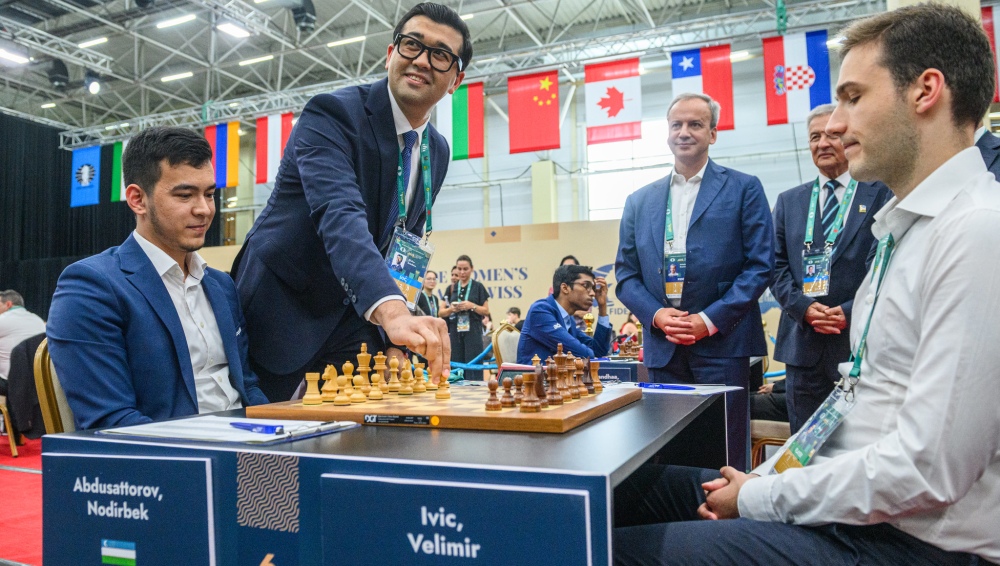
Round one of the 2025 FIDE Grand Swiss ended with a high number of draws in the Open section. By contrast, the Women’s Grand Swiss delivered early drama as several top seeds were upset by lower-rated opponents. The first games of the 2025 FIDE Grand Swiss started at 3 PM local time in Samarkand. Now in its fourth edition, the event has drawn many of the world’s strongest players – including the world champion, Gukesh D – to compete in what is widely seen as the most gruelling Swiss System tournament of the year. The round began with the traditional ceremonial first move on the top boards. Alisher Sadullaev – the First Vice-President of Uzbekistan Chess Federation and CEO of the Youth Affairs Agency of Uzbekistan – made the ceremonial move on board six, featuring Uzbekistan’s Nodirbek Abdusattorov. Sadullaev was joined by FIDE President Arkady Dvorkovich and Chief Arbiter of the event, Laurent Freyd. The opening rounds of Swiss System tournaments, especially round one, usually feature a significant number of victories, as the strongest players are pitted against the lower-rated ones. But the Grand Swiss is different: there are no weak opponents and anyone can win – and lose. It is not surprising then that the majority of the games in the Open event ended in draws. On board one, top-ranked player R Praggnanandhaa drew with Jeffery Xiong in the Exchange line of the French. “Getting Jeffrey [former World Junior Champion] is unlucky, but everyone is strong here, and you don’t really have easy games,” said Praggnanandhaa after the game. The 19-year-old Indian shrugged off suggestions that he felt any pressure as the top-rated player in the tournament. On board two, Arjun Erigaisi drew with Maksim Chigaev, while rising stars Ediz Gurel and Vincent Keymer split a point in the Ruy Lopez. GM Gabriel Sargissian – a highly successful member of the Armenian chess team – had a winning position against none other than Hans Niemann, but let the advantage slip into a draw. Among the notable winners in round one are the World Champion Gukesh D who overcame the seasoned French GM Étienne Bacrot on the black side of the Caro-Kann. Anish Giri defeated Armenia’s Robert Hovhannisyan in the Najdorf line of the Sicilian. The winner of the 2023 Grand Swiss, Vidit Santosh Gujrathi, also started with a victory against Alexander Donchenko, following time trouble. Alireza Firouzja managed to score against Bassem Amin after the Egyptian GM made a crucial mistake in an equal endgame late in the round. Uzbekistan’s biggest hope in this tournament, Nodirbek Abdusattorov, defeated Serbia’s Velimir Ivic. In the Najdorf, Abdusattorov created a passer on the a-file and gradually increased pressure on Black. The opponents traded mistakes in time trouble before the time control, but Velimir was last to err. White is winning here as his a-pawn is unstoppable. 39…Qxa4 40.Bxa4 Rc1 A desperate attempt by Ivic. 41.a8=Q Bd4 42.h4 Rxg1 43.Kh2 Ra1 44.Qe8 and after a few more checks, Black had no more choices but to resign. The first player to score victory in the 2025 Grand Swiss was Aydin Suleymanli from Azerbaijan. The 2609-rated Grandmaster prepared an opening surprise for Indian GM Murali Karthikeyan that included a queen sacrifice. A first look at the position would suggest nothing unusual after the natural 15.Nce5, but here White opted for 15.Nb2 inviting the obvious move 15…Nxc3 – the white queen is trapped and there is no other option but to sacrifice it. After 16.dxc3 Rxd1 17.Bxd1 White is a queen down, but this unbalanced position is evaluated as equal, given Black’s lag in development. 17…e6 18.g4 And now, the only move for Black was to play 18…Ba3 – giving up the white-squared bishop in exchange for activating his pieces. Instead, Black played the logical move 18…Bg6? and after 19.Bg5 Qxc3 20.Rc1 his king is dangerously exposed. 20…Qxb2 21.Rc6+ Kb7 22.Ne5 White is completely dominating the position and the only way for Black to continue the game was to hand back the queen sacrifice: 22…Qxe5 23.Rxe5 Kxc6 24.Bf3+. Although a pawn down, White’s pieces have all the space while Black is struggling. Eventually, Black had to give up another piece but could not escape defeat. The game between the winner of this year’s Women’s World Cup Divya Deshmukh and her Indian compatriot Puranik Abhimanyu brought the first real spark in the tournament. Early in the game, in the exchange line of the Queen’s Gambit, the two played a rare continuation which initially seemed like a blunder: Black has just played 7… Nh5 but after 8.Bxb8 Rxb8 9.g4 he seems to lose a piece. However, after 9…Qh4+ 10.Kd2 Ng3 11.gxf4 Nxh1 12.Nh3 Bd6 13.Bg2 0-0 14.Qh1 Puranik got sufficient compensation through pressure on the centre. Divya went on to create a strong position and dominate, but misplayed in time trouble and ended up losing. The other woman playing in the Open, Alexandra Goryachkina, lost as Black to Turkish prodigy, GM Erdogmus. The Women’s Grand Swiss The women’s event saw a completely different start, with upsets across the top boards. On board one, top seed Anna Muzychuk lost on time to 18-year-old Hungarian WGM Zsóka Gaál – despite holding a clearly better position deep into the game. White is winning after either 36.Ke2 or 36.Kf2, but at this point, she ran out of time. A very unlucky start for Anna, who came to Samarkand with the goal of securing one of the two top spots leading to the 2026 Candidates. European champion Teodora Injac was stunned by Olga Badelka, who took over the initiative in the middlegame and played confidently until the end. Former world champions also had a poor start. On board two, Tan lost to Olga Girya. In the Queen’s Gambit Declined, Tan created a strong position, making an advance on the queenside. However, towards the end, she miscalculated, lost a pawn and ultimately conceded her defeat. Another former world champion, Mariya Muzychuk, also lost – misplaying an endgame as Black against lower-rated Xeniya Balabayeva.
Ancient Samarkand sets the stage for 2025 FIDE Grand Swiss

The historic city of Samarkand welcomed the chess world with a spectacular ceremony blending history, art and chess, setting the stage for one of the strongest tournaments ever. The ceremony started with a short video that took the audience on a journey in time, from the archaeological discoveries of 7th-century Afrasiab to the present day. The carefully crafted narrative began in darkness, with a golden beam of light revealing ancient chess pieces discovered on the historic hill of Afrasiab – evidence that chess had flourished in these lands for over thirteen centuries. The video was followed by choreographic elements that reflected the tournament’s theme, featuring contemporary dance with mirrored figures and geometric formations, reminiscent of chess squares. Then came the formal part of the ceremony, with officials taking centre stage. The first to speak was the Director of the Youth Affairs Agency and First Deputy Chairman of the Chess Federation of Uzbekistan, Alisher Sadullaev, who emphasised the tournament’s importance for chess development in the region. “In the past year Uzbekistan has been engaged in organising a large number of chess competitions thanks to the support of the President of Uzbekistan, Shavkat Mirziyoyev. Samarkand has been made into a global chess arena. We hosted the 2023 World Rapid and Blitz. Next year we are hosting the Chess Olympiad, and it will be a huge event for the world,” Sadullaev said. FIDE President Arkady Dvorkovich thanked the Uzbekistan government and the country’s chess federation for their support in organising this event and for investment in chess in general. “The steps taken over the past 15 years have led to the creation of a great generation which is representing Uzbekistan today. This is a clear signal to all other countries in terms of what needs to be done if you want to be in the top of the chess world,” Dvorkovich said. “This is an exciting journey which is starting in Uzbekistan, bringing excitement to fans all over the world. I wish you all the best of luck,” the FIDE President concluded. Hokim of Samarkand region, Adiz Boboev pointed out how Samarkand and, indeed, Uzbekistan, has become one of the most prominent organisers of international sports events. “Samarkand has become one of the centres of international sports. Just in the past year we have had the World Triathlon Cup and Para Triathlon Cup, the Asian Judo Championship and other international forums”. Boboev noted that “the sports sector has been identified as a priority area of the state policy in our country” and that further investments are coming, including the 2026 chess Olympiad which will take place in Uzbekistan. The drawing of lots The ceremony’s key moment came with the drawing of lots for round one colours. Chief Arbiter Laurent Freyd took centre stage, calling forward the top-rated players from both sections: Praggnanandhaa R (Open section) and Anna Muzychuk (Women’s section). Standing next to the arbiter and the players were two models, dressed in traditional national costumes, holding miniature artworks with Uzbek motifs. The reverse side of each miniature featured white and black colours. Praggnanandhaa ended up selecting the art piece with the black colour on the back, meaning he will start round one with the black pieces. In the women’s section, Anna Muzychuk chose the art piece with the white colour, meaning she starts the tournament as White. The ceremony closed with a vibrant performance of modern Uzbek dance and a video featuring Uzbekistan’s rise to become one of the most prominent chess nations in the world. World Champion Guklesh D: “This tournament is so strong that anybody can win” Earlier in the day, a press conference was held featuring World Champion Gukesh D. The Indian was asked about the decision to play in Samarkand, in an event where his potential challenger will be chosen. “I’m happy to be back here in Samarkand. I was here in 2023 for the World Rapid and Blitz. It’s nice to be back here. Although there’s no need for me to qualify, I think this is still a great tournament. There are not many super strong open Swiss tournaments. It’s an opportunity for me to play in a different format and prove myself”. Gukesh also spoke about how his preparation for the event differed from other – closed – tournaments, where preselected top players take part. “In Swiss tournaments, you need to win more games and take a bit more chances. I’m glad there will be a lot of hungry players and exciting games. Even though I’ve been playing a lot of closed tournaments, I’ll try to adjust my preparation for the open event here”. When asked about who he sees as the favourites to win the event, Gukesh was diplomatic: “This tournament is so strong that pretty much anybody on a great day can win. I don’t really believe in favourites.” The full report from the press conference can be found HERE. Round one starts on Thursday, September 4, at 3 PM local time. The Round 1 pairings can be found here: Open: grandswiss2025.fide.com/open/ Women: grandswiss2025.fide.com/grand-swiss-women/ Written by Milan Dinic Photos: Michal Walusza Official website: grandswiss2025.fide.com About the event The FIDE Grand Swiss is one of the most significant tournaments in the World Chess Championship cycle, featuring many of the world’s strongest chess players. Launched in 2019 (with the women’s event starting in 2021), the 11-round Swiss system tournament is held every two years. Considered as one of the most difficult and unpredictable chess events given its open nature, the top two finishers in both categories qualify directly for the World Candidates tournament, where a challenger for the title of world champion is chosen. The 2025 edition runs from 4th to 15th September at the EXPO Centre in Samarkand, Uzbekistan. There are 116 players taking part in the Open and 56 players in the Women’s competition. The total prize fund for the event it $855,000 – $625,000 for the Open and $230,000 for the Women’s event. All the rounds will be broadcast live on FIDE’s official
Opening Press Conference of 2025 FIDE Grand Swiss
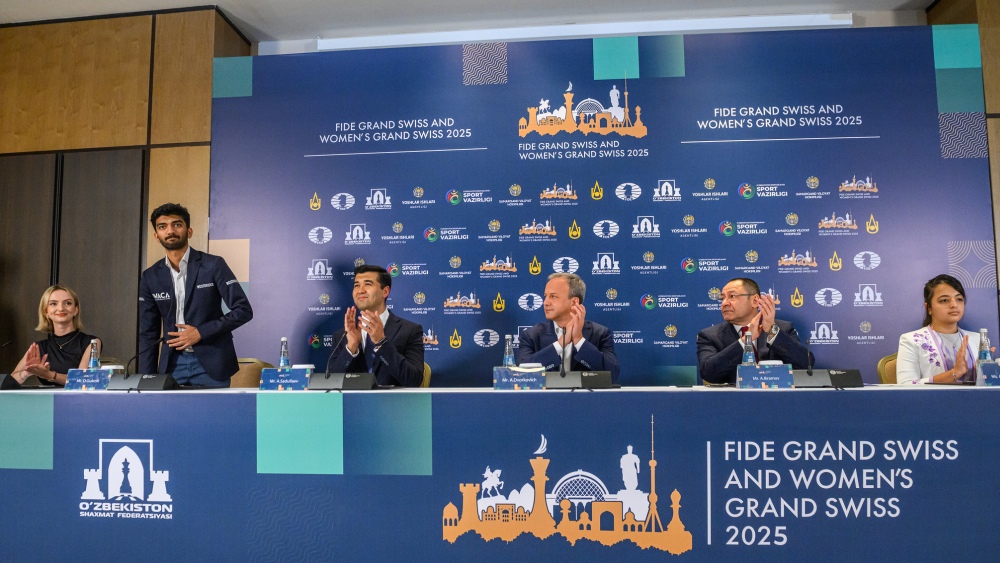
The opening day of the 2025 FIDE Grand Swiss started with a high-profile press conference featuring World Champion Gukesh D, FIDE President Arkady Dvorkovich and Adham Ikramov, the Minister of Youth Policy and Sports of Uzbekistan. Speakers highlighted the significance of the tournament for the chess world in general as well as for chess in Uzbekistan and Asia. FIDE President Arkady Dvorkovich opened by thanking the government and the chess authorities of Uzbekistan for their dedicated support in organising the tournament and helping to increase the prize fund for the event. “The Grand Swiss is the strongest open competition in the two-year World Championship cycle, allowing all top players to fight for the spots in the Candidates tournaments. There are no weak opponents here and everything is usually decided in the last round, which will bring huge excitement for the spectators”. He noted that the Grand Swiss is “a test event for the 2026 Olympiad”, which will be taking place in Samarkand in September 2026. Dvorkovich concluded by thanking the World Champion, Gukesh D, for choosing to participate in the event which will help the promotion of chess. Adham Ikramov, Minister of Youth Policy and Sports of Uzbekistan noted that the country has recently hosted several international sports events and that it enjoys the support of the international sporting organisations thanks to the high quality and standard of the organisation it is providing. “Just two years ago, we held the World Rapid and Blitz here. Last year, in Budapest [during the Chess Olympiad] we met with the FIDE President at the time when Uzbekistan has risen among the top countries in chess. Next year we will organise the Olympiad and we will do it really well”. Alisher Sadullaev, the First Vice-President of Uzbekistan Chess Federation, spoke about the preparations for the 2026 Chess Olympiad which Uzbekistan will host, highlighting Samarkand’s status as a “global chess arena”. “Uzbekistan’s history traces back 3000 years, and this history gives a lot of sense about chess back in the past. One of the great conquerors of the world, Amir Timur, he brought all the chess masters to Samarkand and organised huge championships. It’s very logical to repeat the same tradition. The President of Uzbekistan always empowers chess and brings together the most talented [chess] minds in the world, like here in Samarkand”, Sadullaev said. “The whole Uzbek chess team that will be representing our country in the next Olympiad is in Samarkand and preparing. And this event will play a crucial role in getting them ready for the huge role next year they are about to play [at the Olympiad] and we expect them to win”. Sadullaev pointed out that the Uzbekistan Chess Federation pays attention to both male and female players, noting the example of Afruza Khamdamova, a two-time girls’ World Youth Champion. “This is one of the biggest tournaments I have ever played. Here we will have many of the elite women world players and I want to show them that I can play on equal footing with them,” said Khamdamova. World Champion Gukesh D was asked about the decision to play in Samarkand, in an event where his potential challenger will be chosen. “I’m happy to be back here in Samarkand. I was here in 2023 for the World Rapid and Blitz. It’s nice to be back here. Although there’s no need for me to qualify, I think this is still a great tournament. There are not many super strong open Swiss tournaments. It’s an opportunity for me to play in a different format and prove myself”. Gukesh also spoke about how his preparation for the event differed from other – closed – tournaments, where preselected top players take part. “In Swiss tournaments you need to win more games and take a bit more chances. I’m glad there will be a lot of hungry players and exciting games. Even though I’ve been playing a lot of closed tournaments, I’ll try to adjust my preparation for the open event here”. When asked about whom he sees as the favourites to win the event, Gukesh was diplomatic: “This tournament is so strong that pretty much anybody on a great day can win. I don’t really believe in favourites.” The World Champion also praised Nodirbek Abdusattorov – Uzbekistan’s strongest player who will be participating in the event – as a great champion and competitor. Written by Milan Dinic Photos: Michal Walusza Official website: grandswiss2025.fide.com/
Final call: Share your story in the FIDE Social Chess Storytelling Challenge 2025

The FIDE Social Chess Storytelling Challenge 2025 is underway, and filmmakers, educators, and social leaders from across the globe are already sharing how chess transforms lives. With the deadline set for 25 October 2025, there’s still time to add your voice to this unique celebration of chess as a force for change. Submitted Stories Entries so far range from polished productions to heartfelt grassroots films. Some use animation, others capture simple classroom moments, but all shine a light on the power of chess. Each story follows one of the challenge’s three themes: Personal Development Chess builds confidence, sharpens critical thinking, and strengthens problem-solving skills. A powerful example comes from the United States, where the film Building Minds With Chess features GM Pontus Carlsson showing how the game nurtures decision-making and resilience among young learners in New Orleans. Social Transformation Chess brings diverse groups together, fostering inclusion, and supporting education and rehabilitation programs. In South Africa, the documentary Helping Kings and Queens Make the Right Moves explores the game’s impact in a disadvantaged community where young people face crime and gang violence. At its heart is the story of Jedidah, a girl who, after failing second grade, embraced chess as a way to rebuild her confidence and ultimately blossomed as both a student and a player. Opportunities & Livelihoods Chess offers pathways for personal and professional growth, and the entry “Women’s Chess guide” showcases chess as a lifestyle through the lens of women at every level of the game, from casual players to traveling international competitors. Beyond showing a Queen’s Gambit-like story of a female player rising to the top, it also offers a glimpse of female chess communities and clubs, an image still too rarely seen on screen. Categories & submission details The competition is open to entries in two categories: Professional – High-quality, polished productions. Grassroots – Creative and amateur video submissions Key dates: Deadline: October 25, 2025 Awards Winners will receive: A special FIDE trophy, An invitation to the FIDE Olympiad 2026 Opening Ceremony (including two nights’ accommodation for two people), A global spotlight as top films will be showcased at the 2025 Social Chess Conference, across FIDE’s social media, and other social chess events. Award categories: Best Short Film (Professional) Best Grassroots Film (Amateur) FIDE Social Commission Choice Award Who can participate? Everyone is welcome (no restrictions on age or nationality) and filmmakers may submit more than one entry. Submit your film here: fide.com/social2025-storytelling-challenge/#send
Fujairah Global Chess Championship: Pranav V claims title
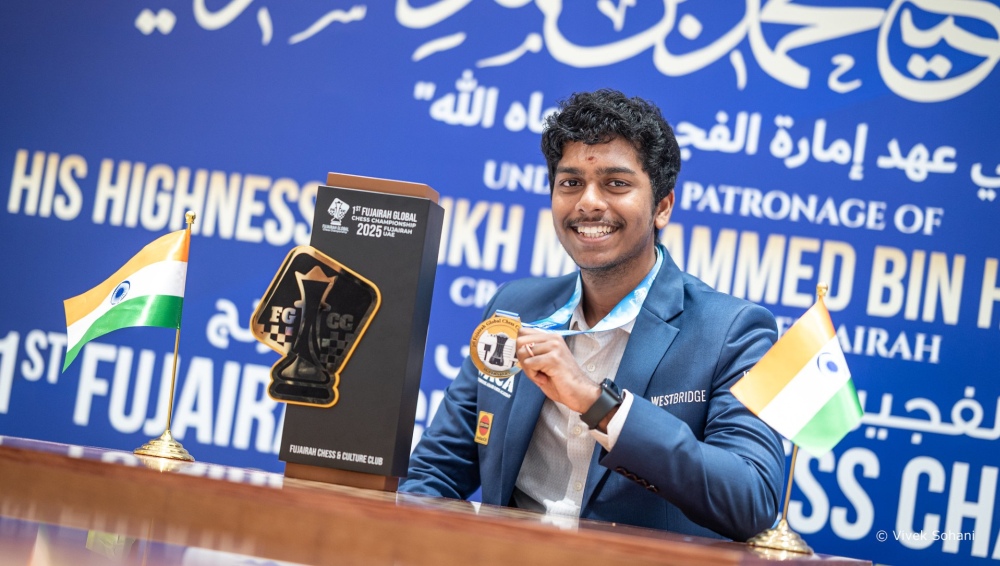
India’s young Grandmaster Pranav V emerged victorious in the UAE, capturing the coveted title in the Fujairah Global Chess Championship – Superstars Section. In the final round, he defeated Spain’s GM Alan Pichot in a masterful rook endgame, finishing on 7/9 to secure the championship. With this exceptional performance, Pranav gained 28 rating points, reaching a career-best live rating of 2631, alongside 17.6 FIDE Circuit points. He also claimed the top prize of US$ 23,000. Every game on the top boards proved decisive for the final standings. On Board 2, GM Amin Tabatabaei (Iran) was held to a draw by GM Alexander Donchenko (Germany). On Board 3, GM Brandon Jacobson (USA) drew against top seed GM Nihal Sarin (India). On Board 4, GM Abhimanyu Mishra (USA) shared the point with GM Sanan Sjugirov (Hungary). These results paved the way for GM Jose Eduardo Martinez (Mexico) to reach the podium by defeating GM Sam Shankland (USA). Three players—Jacobson, Martinez, and Tabatabaei—all finished on 6 points. On tiebreaks, Brandon Jacobson took second place, Jose Eduardo Martinez third, and Amin Tabatabaei fourth. They earned US$ 13,000, US$ 9,000, and US$ 8,000 respectively. China’s GM Zhu Jiner, the only female competitor in the Superstars Section, impressed once again. She defeated Bulgaria’s GM Ivan Cheparinov in the final round, finishing fifth with 5½ points and earning US$ 7,000. Also placing in the Top 10 (by tiebreaks) were GMs Aditya Mittal (India), Alexander Donchenko (Germany), Sanan Sjugirov (Hungary), Abhimanyu Mishra (USA), and Lu Shanglei (China). Superstars section – complete results Masters section In the Masters Division, USA’s GM Brewington Hardaway triumphed with 7.5 points. GM Ata Umut Akbas (Turkey) finished second on 7/9, followed by GM Artin Ashraf (Iran) in third, GM Karthik Venkataraman (India) in fourth, and GM Reza Mahdavi (Iran) in fifth—each placement determined by tiebreaks. Masters section complete results Open section In the Open category of the Fujairah Global Chess Championship, FM Alimzhan Zhauynbay (Kazakhstan, U12) delivered a sensational performance to clinch first place with 8/9. Armenia’s Davit Baghdasaryan (U16), Turkmenistan’s CM Allayar Shirlilyev, and Iran’s CM Benyamin Babaniya all scored 7.5 points, taking second to fourth place respectively on tiebreaks. China’s Huaqi Liu (U14) also impressed, scoring 7.5 points to finish fifth. Open sections complete results Distinguished guests at the closing ceremony The championship’s closing ceremony was attended by esteemed dignitaries, including: E. Sheikh Abdullah bin Hamad bin Saif Al Sharqi, President of the UAE Bodybuilding and Fitness Federation Taryam Matar, UAE Chess Federation President GM Dana Reizniece-Ozola, FIDE Deputy Chair and of the European Chess Union Deputy President GM Victor Bologan, FIDE Executive Director Ali Nihat Yazıcı, President of the Turkish Chess Federation Written by Pavel Dvorkovich & Niklesh Jain Photos: Anna Shtourman, Vivek Sohani and Aditya Sur Roy Broadcast: YouTube Fujairah Chess and YouTube ChessBase India Hindi Flickr album: flickr.com/photos/203288106@N04/
FIDE Circuit: Praggnanandhaa pulls away with dominant summer
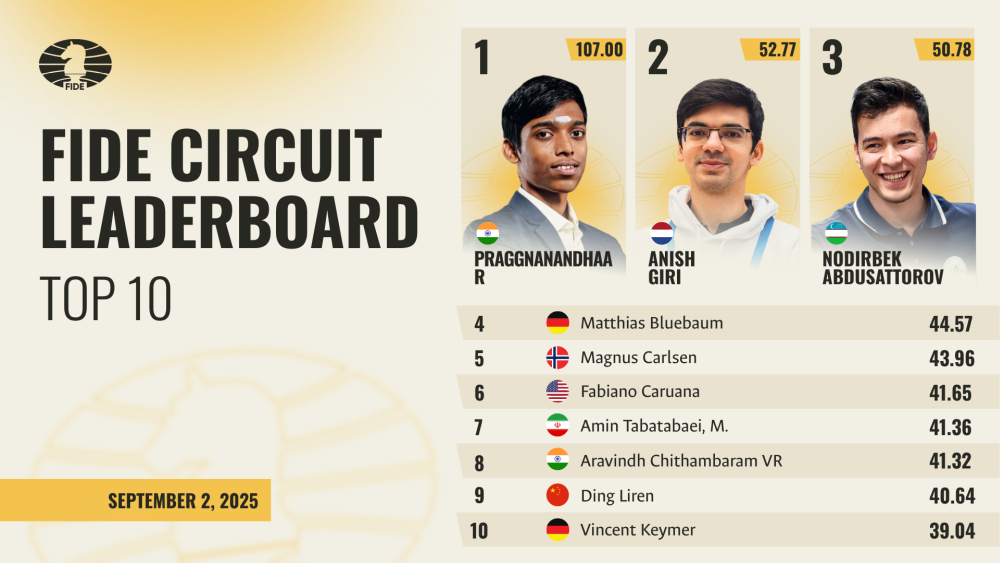
Praggnanandhaa R extended his lead in the FIDE Circuit race over the summer with impressive performances at the UzChess Cup Masters (1st place, 22.19 points) and the 12th Sinquefield Cup (2nd place, 20.72 points). With only four months remaining, he now holds a lead of nearly 55 points over second-placed Anish Giri—a gap that already looks insurmountable given the young Indian’s excellent form. Barring a highly unlikely chain of unfavorable circumstances, Praggnanandhaa seems poised to secure his spot in the 2026 Candidates Tournament. Anish Giri rose to second place in the standings thanks to a strong performance at the Quantbox Chennai Grand Masters, which earned him 20.94 points. The winner of that event, Vincent Keymer, broke into the top 10, while Amin Tabatabaei returned to this group following his good showing in the Fujairah Global 2025 – Superstars. Nodirbek Abdusattorov climbed to third in the race after finishing third at the UzChess Cup Masters, adding 18.56 points to his tally. Matthias Bluebaum also had a productive summer, gaining 17.91 points from his performances at the Sparkassen Chess Trophy 2025 A-Open and the 61st International Akiba Rubinstein Chess Festival, moving up to fourth on the leaderboard. Meanwhile, Ding Liren continues to slide down the standings—a predictable trend given that he has played only one Circuit-qualifying event this year. Notably, several Grandmasters in the current top 20—Chithambaram Aravindh, Vincent Keymer, Javokhir Sindarov, Maxime Vachier-Lagrave, and Vladimir Fedoseev—have played only two Circuit tournaments so far. This leaves them significant potential to climb the rankings. With this in mind, the upcoming FIDE Grand Swiss is expected to trigger major shifts within the top 10. However, it is unlikely to threaten Praggnanandhaa’s commanding position at the summit. We maintain a dedicated page on our website for the FIDE Circuit 2025, featuring the latest information on eligible tournaments, current standings, and regulations. Visit: FIDE Circuit 2025
Štěpán Hrbek and Tereza Rodshtein crowned Czech Champions
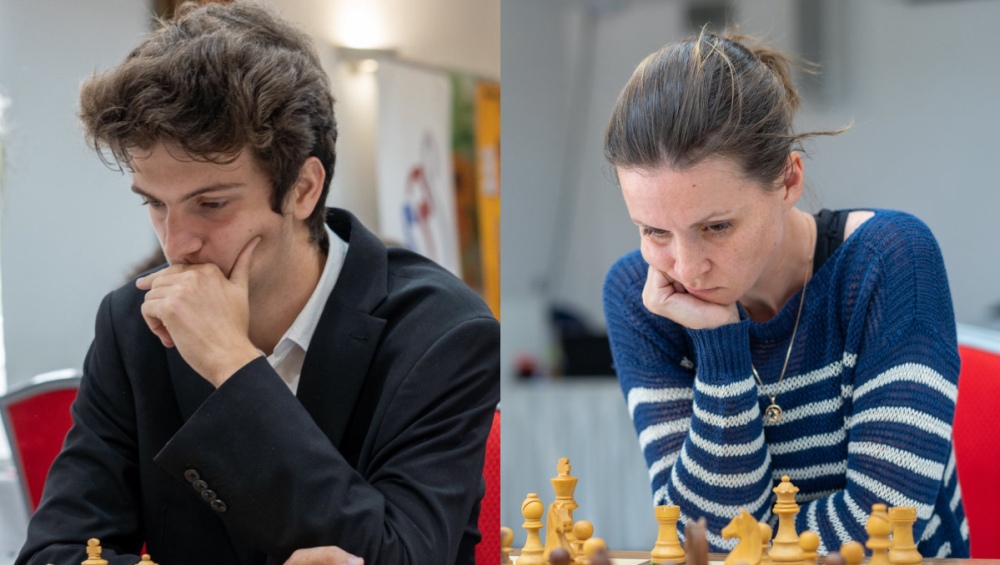
The thrilling final round decided this year’s chess champions of the Czech Republic. In the women’s category, Tereza Rodshtein clinched the title, defeating Julia Movsesian in the final of the elimination tournament. In the open round-robin event, seventh seed Štěpán Hrbek emerged as a surprise winner, while Jan Vykouk and Tadeáš Kriebel claimed silver and bronze, respectively. The Czech Championship returned to Plzeň after a five-year break. While David Navara dominated the 2020 open tournament, this year he did not take part due to a scheduling conflict. Nevertheless, he attended the final two rounds at the Plzeň Congress Center Parkhotel as a commentator—much to the delight of the spectators. The games certainly lived up to expectations: only 22 out of 45 ended in draws. With two rounds remaining, eight of the ten players were still in contention for gold, underscoring the tournament’s competitiveness. Jáchym Němec and Jan Vykouk traded the lead for much of the tournament, but neither managed to convert their chances in the decisive final round. Vykouk drew his game, while Němec lost—to none other than 19-year-old Štěpán Hrbek, who thereby secured his unexpected national title. His final score of 5.5/9 reflected the remarkable balance of the event. The pre-tournament favorites struggled: Václav Finěk finished fifth, and Štěpán Žilka placed eighth. Final standings Open The women’s championship, held for the third consecutive year in a knockout format, began with a preliminary round followed by quarterfinals, semifinals, and the final. Each round featured two classical games, two rapid games, blitz, and, if necessary, an Armageddon decider. Several junior players also participated but were unable to match the experience of their older opponents. Tereza Rodshtein overcame all challengers on her way to the title, defeating Karolína Pilsová, Anna Lhotská, and finally two-time defending champion Julia Movsesian. In the bronze medal match, Kristýna Petrová outplayed Anna Lhotská. Tournament director and Chairman of the Czech Chess Association Martin Petr reflected positively on the event: “I am thrilled with the course of this year’s Czech Championship. I would like to thank all the players for their fighting spirit and fair-play approach. The spectators certainly enjoyed the exciting games and the tournaments—and I did too.” The organizer, Chess Club 64 Plzeň, expressed gratitude to all who supported the 2025 Czech Championship: the City of Plzeň, the Czech Chess Association, Plzeňská teplárenská, Parkhotel Plzeň, Ubytování U Foltýnů, PROdiamant, Calliditas Edutainment, NODAK, and the 64 Foundation. This article is based on a report by the Czech Chess Federation Official website: chess.cz/
FIDE September 2025 rating list: Vincent Keymer debuts in top 10 Open
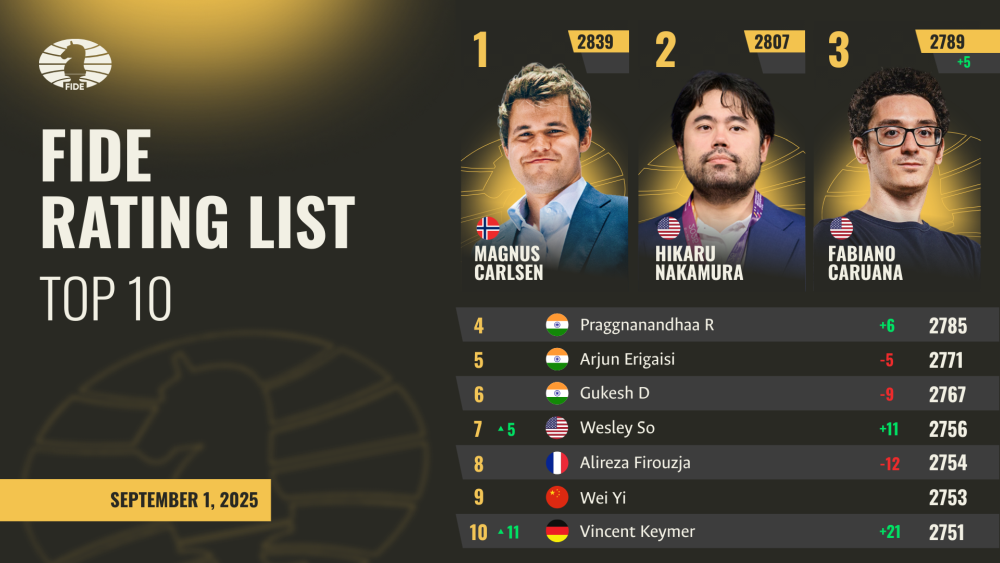
The September 2025 rating list was shaped primarily by results from the Sinquefield Cup, Quantbox Chennai Grand Masters, 61st International Akiba Rubinstein Chess Festival, and the Spanish League Honor Division 2025 – a Swiss team tournament held in Linares. The top 10 Open saw several notable changes in August. Wesley So returned to this elite group after a ten-month absence, thanks to his victory at the Sinquefield Cup, which earned him 11 rating points. Rameshbabu Praggnanandhaa also shone this competition, adding 6 points and reaching a career-high rating of 2785. Photo: Rafal Oleksiewicz The biggest breakthrough came from Vincent Keymer, whose dominant performance at the Quantbox Chennai Grand Masters brought him 21 rating points and secured his first-ever place in the world top 10. In the women’s rankings, Zhu Jiner continued her steady climb. A strong showing in the Isbank of Türkiye Chess Super League netted her 12 points and lifted her to a career-best 2548. Biggest gains in top 100 Open and Women Abrahamyan, Tatev WGM USA 2407 (+64) Batsiashvili, Nino GM GEO 2469 (+28) Alekseenko, Kirill GM AUT 2674 (+22) Keymer, Vincent GM GER 2751 (+21) Yakubboev, Nodirbek GM UZB 2681 (+18) Ouellet, Maili-Jade WGM CAN 2348 (+17) Fataliyeva, Ulviyya IM AZE 2385 (+16) Tsolakidou, Stavroula IM GRE 2445 (+14) Andreikin, Dmitry GM FID 2710 (+15) Wojtaszek, Radoslaw GM POL 2661 (+13) The month’s biggest rating gainer was Tatev Abrahamyan, who scored an impressive 63 points at the Budapest One Week 2025. With this performance, the American WGM crossed the 2400 threshold for the first time and soared to a career-high 37th place in the women’s top 100. Photo: Michal Walusza Other strong performances came in the Spanish League Honor Division 2025, where Nino Batsiashvili, Kirill Alekseenko, Stavroula Tsolakidou, and Ulviyya Fataliyeva all collected valuable points. Meanwhile, Maili-Jade Ouellet significantly boosted her rating after an excellent showing at the Championnat Invitation du Québec 2025. Photo: Dolnośląski Związek Szachowy At the 61st International Akiba Rubinstein Chess Festival, Nodirbek Yakubboev won the round-robin event, gaining 16 points, while runner-up Radosław Wojtaszek added 13 to his tally. Finally, Dmitry Andreikin marked a successful return to classical chess after a ten-month break, earning 15 points with a solid performance in the Isbank of Türkiye Chess Super League.
FIDE Grand Swiss 2025: Expect the unexpected in Samarkand

For two weeks in September, the ancient capital of the Silk Road will be home to many of the best chess players in the world. When talent, youth, experience, and ambition collide, uncertainty is the only rule. Since its initiation in 2019, the FIDE Grand Swiss – held every two years – has distinguished itself as the strongest classical chess tournament. Featuring 11 rounds played under the Swiss system it is a battleground where the best face the best and only exceptional performance can secure victory. This is hardly surprising given what is at stake – substantial prizes and coveted qualifying spots for the 2026 Candidates Tournament in the Open and Women’s categories. The total prize fund amounts $855,000, with $625,000 allocated to the Grand Swiss and $230,000 to the Women’s Grand Swiss. The primary qualification goal of the tournament is clear: the top two finishers in both the Open and Women’s events will secure their places in the 2026 Candidates, which will decide the next challenger for the World Championship title. “The Grand Swiss has always stood as a unique tournament and one of the most anticipated events in the FIDE calendar. We are pleased that it will be taking place in Uzbekistan – a great chess nation which is investing in the sport and has a proven track record in organising major chess events,” FIDE President Arkady Dvorkovich said. “The rising youth dominating the chess scene in recent years will be tested in Samarkand, facing many of the most seasoned players on the planet. I am very much looking forward to the clash of generations. Overall, I believe that this tournament will have a strong positive impact on the promotion of chess, not just in Uzbekistan or central Asia, but much more broadly,” he added. The unpredictable winners of the Grand Swiss A look at the previous editions of the Grand Swiss – three in the Open and two in the Women’s category – shows that one thing is clear: once the games start, there isn’t much difference between the rating favourites and the underdogs, and nothing is certain until the end. In 2019, underdog Wang Hao emerged as the winner after a lucky victory over David Howell. The Chinese GM edged out the favourite, Fabiano Caruana, thanks to a better tiebreak. In that tournament, the then 23-year-old Kirill Alekseenko stunned the field, finishing in third place. Then in 2021, in Riga, Alireza Firouzja made his big mark on the global scene by overcoming seasoned GMs and winning the tournament outright. In a field dominated by youth, the experienced player Alexei Shirov delivered a great performance, tying for third place and earning a spot in the 2022 FIDE Grand Prix. In 2021, the inaugural Women’s Grand Swiss was held, which was marked by Lei Tingjie’s, securing the title with a round to spare. In the third edition, held at the Isle of Man in 2023, Firouzja faltered and finished in the middle of the scoreboard, but it was the Indian players who stole the show, with Vidit Santosh Gujrathi capturing the Open and Vaishali Rameshbabu triumphing in the Women’s competition. Vidit, despite losing in round one, rallied brilliantly to finish half a point ahead of Hikaru Nakamura. Players to look out for at the 2025 Grand Swiss This year’s Grand Swiss will see 116 players take part in the Open, including the World Champion Gukesh D, and 56 in the Women’s tournament. The Open tournament field is formidable. Eighteen players boast ratings above 2700, placing them in the Super-GM category, alongside 74 GMs rated 2600–2699 – world-class competitors capable of toppling anyone. With top contenders hailing from chess powerhouses such as India, the U.S, France, Germany, China, the competition will be fierce. Photo: Maria Emelianova Rameshbabu Praggnanandhaa, the current leader of FIDE Circuit, headlines the ranking list in Samarkand. The Indian youngster – who only turned 20 on August 10 – is already a seasoned player having dominated many tough tournaments and represented his country in Olympiads and team events. Praggnanandhaa is enjoying a career-best year as he became the top-ranked player in his native India and fourth in the world, his highest placement so far. Most recently, Praggnanandhaa was the runner-up of the Sinquefield Cup, which secured him a place in the playoff stage of the Grand Chess Tour. The superb strength and performance he has had this year so far has put Praggnanandhaa at the top of the favourites to win the Grand Swiss. Another title hopeful is Gukesh D – the 19-year-old World Champion who has made history several times already, most notably by becoming the first Indian to breach the 2750 ELO barrier, as well as being the youngest-ever winner of the Candidates and later on World Champion. Gukesh has had a bright year so far – finishing as the runner-up at Tata Steel and taking third place in Norway Chess, where he defeated Carlsen and Nakamura. Gukesh’s strength and world crown make him an exceptionally strong favourite in the tournament, but his status also makes him a prime target for many of the players in the Grand Swiss. The 19-year-old is already renowned for his focus and for managing to keep his nerves steady. Whether he does that in Samarkand will be decisive for his performance in the Grand Swiss. Arjun Erigaisi, India’s third big hope at the event, is also in strong form. A former national number one, he’s now ranked among the best players in the world. Then there’s Vidit Santosh Gujrathi, the 2023 Grand Swiss winner chasing for another title. Other top players in the race include the 2021 Grand Swiss winner, 22-year-old Alireza Firouzja, who captured another Bullet Chess Championship title in 2025, had a solid performance at the Superbet Rapid & Blitz and was a runner-up in the Esports World Cup, losing to Magnus Carlsen. Photo: Rafal Oleksiewicz Germany’s Vincent Keymer is another one to watch out for – the winner of the German Championship, Keymer is

